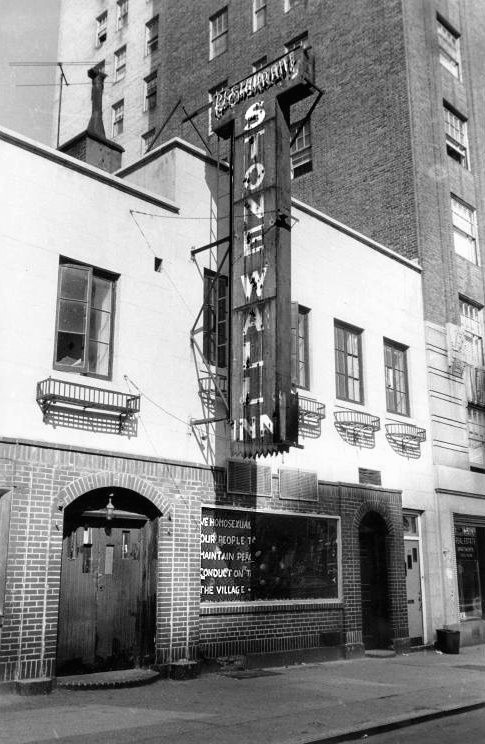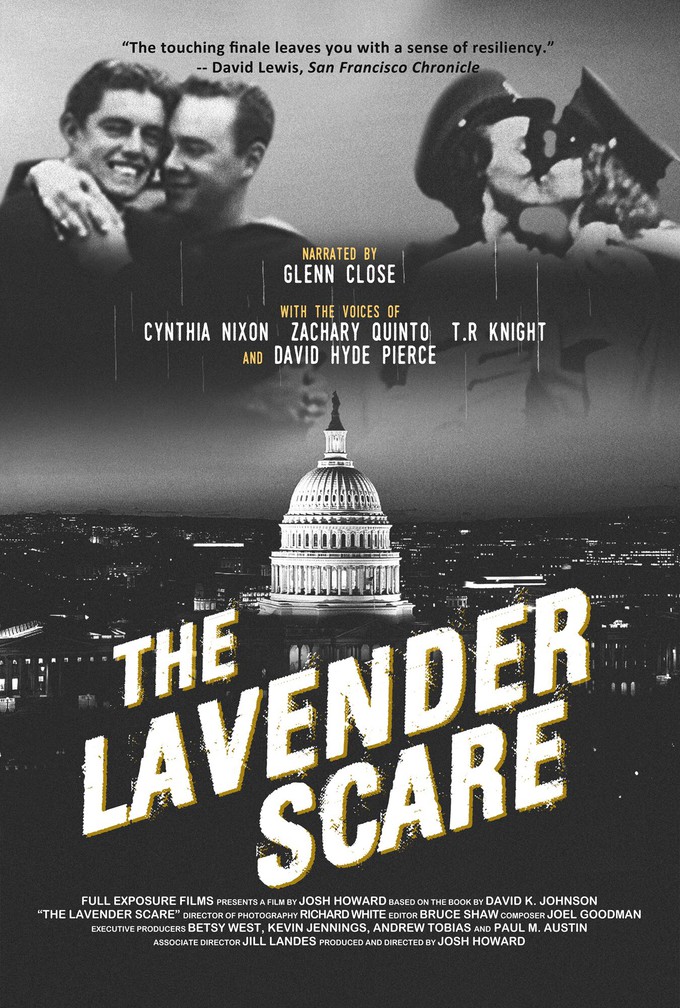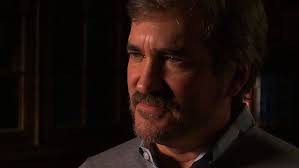
Stonewall Inn, 1969 (from wikipedia)
June is LGBTQ Pride Month in the US, established to commemorate the Stonewall Riots of late June, 1969.
For many years, police had been attacking gay clubs and social spaces, making mass arrests, and purposefully outing members of the community in an effort to shame them into submission, and into hiding. One night, in New York's Greenwich Village, the patrons at the Stonewall Inn, including gay men, lesbian women, and transgender women, decided to give them Arya Stark's response to Death... "Not today." As the police entered the establishment to round up "the gays", the bar erupted in defiance, violently ousting the police in a riot that spilled into the street, which would be followed by further escalation in coming days, as police sent larger numbers of officers into Greenwich Village, only to be met with stronger resistance.
These events would come to be known collectively as the Stonewall Riots, and sparked other mass protests and marches across the country. It's considered by most to be the birth of the Gay Rights movement... but the spirit of defiance that sparked this pushback has deeper roots, reaching back to the overtly discriminatory actions of Eisenhower's Employee Security Program in 1953, which called for the firing of all gay and lesbian government employees. This was done under the guise of "national security". Headlines reading things like "Sex Perverts Are Easy Marks For Russian Spies" served to underscore the narrative that this was justifiable. Under the guidance of Joseph McCarthy, the Red Scare ignited an insidious, hateful new campaign... The Lavender Scare. Despite no one being able to produce a single example of a gay or lesbian person violating national security, tens of thousands of government employees saw their lives and careers destroyed, as a result.
One of those individuals was an astronomer with the US Army map service. His name was Frank Kameny, and he would become an internationally recognized leader in the movement for LGBTQ rights.
He did not go quietly.
He did not retreat into the closet.
He did not accept the narrative that his sexuality was a mental illness, or that it compromised who he was or what constituted his quality as a human being and as an employee of the Federal Government.
He fought back.

THE LAVENDER SCARE tells the story of Frank, and so many countless others, whose ousting, and outing, by the country they loved and worked for, would build the foundations of a social movement that would finally explode in that small Greenwich Village bar nearly a decade and a half after his firing.
Director Josh Howard based his film on the book of the same name, by David K. Johnson. It details the stories of many individuals affected by the actions of the government against the gay community, and explores the implementation of the campaign by members of the FBI and law enforcement community at the time. Their gleeful recollections of firing the "sodomites, CSers". "queers", etc., without due process or even being allowed to face their accusers, are stomach-turning, rage-inducing, and heartrending in equal measure. The (often successful) efforts to coerce the gay employees to out their friends in exchange for leniency (only to be fired and outed anyway) are horrifying.
Howard expands on Johnson's book through these law enforcement interviews, and it lends substantial weight and emotional impact to the film. You get a real sense of how absolutely, infinitesimally small one would feel in the face of such broad governmental and social hatred.
The film expertly weaves the stories of several individuals on the receiving end of this campaign of personal destruction with the recollections of those who perpetrated it in a way that palpably conveys a sense of hopelessness and dread that continued to build through the mid 50s.
The tone begins to shift with the introduction, and relation of the firing of, Frank Kameny. His refusal to cower in the face of such powerful social and institutional exclusion became contagious. The defiant manner in which he carried himself in response would slowly (at first) inspire others to stand beside him and speak out for equal treatment. In 1965, Kameny would lead a group of a dozen sharply dressed (he issued a dress code!) picketers in front of the White House... a full four years before Stonewall. This was an unprecedented act of bravery, and changed the tone of the conversation nationally. It is from this point that the film begins to feel hopeful as it relays the tale of the ones who took the first steps on the road out of the darkness.
Howard expertly carries the narrative across the decades with the help of archive footage, previous interviews, and new footage shot for the production. By the end of the film. we see both the individual outcomes of the persons whose stories drive the narrative, as well as the broader consequences of the work done by Kameny and so many others in fighting the discrimination of the Lavender Scare. It culminates with the signing of "Don't Ask, Don't Tell" by President Clinton in 1995 (an action considered both groundbreaking and far short of an equality measure, but a necessary one), and Kameny's being honored by President Barack Obama in 2010, at a ceremony where the Don't Ask, Don't Tell act was finally repealed in favor of measures that got much closer to reflecting true equality.
Several well-known personalities have lent their voices to the film, including Zachary Quinto (STAR TREK, AMERICAN HORROR STORY), Cynthia Nixon (SEX AND THE CITY, THE ADDERALL DIARIES), TR Knight (GREY'S ANATOMY, GENIUS), David Hyde Pierce (FRASIER, A BUG'S LIFE), and narrator GLENN CLOSE. Their readings of the letters and diaries from the cast of real-life characters to family, and to those who they were imploring for help, lend a delicately personal stamp to an already affecting narrative.
THE LAVENDER SCARE is an engaging, touching, often heartbreaking look at the experiences of a community, and the individuals within it, as they experience, and respond to, a nation gripped by fear, paranoia, and hatred. It is very much a tale for modern times, and it doesn't take a lot of imagination to see parallels with what we see today from the Trump administration and its attitudes toward Muslims, immigrants, and, not-ironically-in-the-least, the LGBTQ community. I see this film as a clarion call to wake up and pay attention to the things we see taking place, and to respond to them.
If we don't learn from our history, we will forever be forced to repeat it.
If you are, as I am, a member of the LGBTQ community, this film will enrage and crush you, and leave you with both a sense of hope, and of urgency to hold onto the progress made.
If you are not a member of the LGBTQ community, I urge you, please, watch this film. It will reveal to you a part of our history that has, for too long, been swept under the rug. Through that, I hope, you will gain empathy and understanding that we ALL have a role to play in the future, and within society.
I hope.

LAVENDER SCARE director, Josh Howard
I sat down for a talk with THE LAVENDER SCARE director, Josh Howard, to discuss the film, the people whose stories it relays, and how it might apply to today's climate. Introductions and pleasantries exchanged, I began by asking:
What inspired you to make the film?
"Well, I came across this story of the Lavender Scare, and I knew nothing about this. It's such an important slice of our history. Tens and tens of thousands of people were fired from jobs or were denied employment, and I just felt that it was a natural for a documentary, and an important one."What inspired you to make the film?
"Well, I hope so. I think this upcoming election is going to be a turning point, one way or the other. In a way, this is one of the most crucial decisions that this country is making, because the choice is not going to be clearer, and I hope that the film, in a historical way, sets off alarm bells for people today. You know, don't be complacent. Get involved. Look at Frank's example... we have to be vigilant. There's a history in our country of demonizing particular minority groups, at certain times: Mexicans during the Great Depression, Japanese people during World War Two, and then gay people during the McCarthy era; and history has not looked kindly on those events. I think it would be good for people to think, "How are these days going to be judged ten and twenty years from now? How will people look back at how we treated immigrants and minorities?" You know, what are we doing today? I think that's something that people should think about."
Would you say that is the biggest takeaway that you hope people carry from seeing this film?
"I would say so. I think that, for a broad audience, is certainly the message. For the LGBTQ community, in particular, I think it's important for them, to know that equality isn't a given. The homophobia of the 1950s was clearly a backlash against an earlier time when being gay was less of a big deal. This is, I think, one of the eye-opening things, for me, frankly, that I didn't realize how accepted homosexuality had been in the 20s, 30s, and 40s. I think a big takeaway from the film is that the move for social equality does not continue in a straight line, necessarily, and we have had great victories over the past decade and more, but there can be a step or two back, along the way, as well. We have to be vigilant about protecting the rights that have been won."
Absolutely. I think hindsight can be critical, from both perspectives, but an example like the signing of "Don't Ask, Don't Tell" by Clinton, in '95 was huge, at the time. You hear people talk today, and they say, "Oh, it wasn't nearly enough, and he should've done more," but that was huge then. It changed a lot of people's lives.
"It did. It did, but it also underscored the idea that we should stay in the closet and not express our true personalities. But again, as you say, it was a step moving in the direction that we eventually arrived at. You know, President Obama was not a supporter of gay rights at one time, but he, as he put it, evolved."
And that's what it takes, as individuals, and as a society.
"Yes."
Watch the trailer for THE LAVENDER SCARE below, and do yourself the favor of catching it upon release. Screenings are listed at https://www.thelavenderscare.com/
That's all for now.
Until next time, happy Pride!
Benny No-Good

